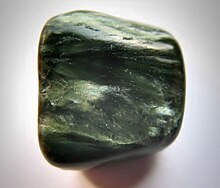Seraphinite

Seraphinite is a trade name for a particular form of clinochlore, a member of the chlorite group.
Seraphinite apparently acquired its name due to its resemblance to feathers due to its chatoyancy. Seraphinite is named after the biblical seraphs or seraphim angels.[1] With some specimens the resemblance is quite strong, with shorter down-like feathery growths leading into longer "flight feathers"; the resemblance even spurs fanciful marketing phrases like "silver plume seraphinite." Seraphinite is generally dark green to gray in color, has chatoyancy, and has hardness between 2 and 4 on the Mohs scale of mineral hardness.
Seraphinite is mined in a limited area of eastern Siberia in Russia. Russian mineralogist Nikolay Koksharov (1818-1892 or 1893) is often credited with its discovery. It occurs in the Korshunovskoye iron skarn deposit in the Irkutskaya Oblast of Eastern Siberia.[2]
References[]
- Gemstones
- Phyllosilicates
- Mineral stubs